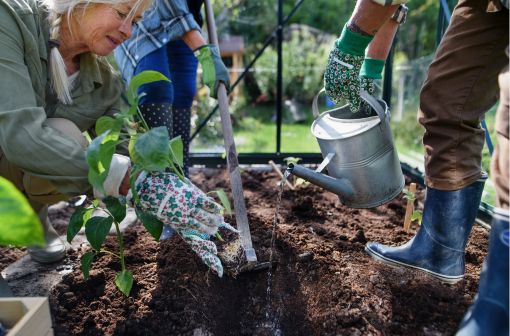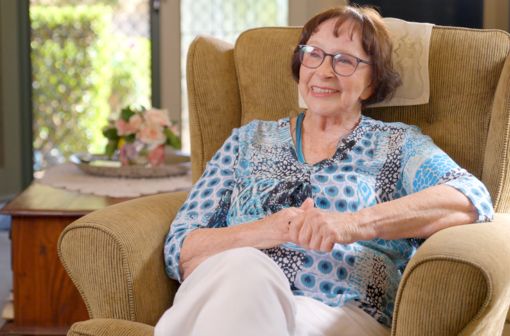“I hope that we all work together to all be able to celebrate on one day, as all Australians. We're not there now, but it will happen. It takes little steps, see.”—Aunty Isabel Reid.
As one of its oldest living survivors, Aunty Isabel Reid works hard to raise awareness of the Stolen Generations, as well as advocating for the rights of Aboriginal and Torres Strait Islander peoples.
She’s a reminder that we’re not so far removed from the past and that a lot can be achieved with perseverance and positivity.
“Being negative won't get you anywhere, you need to be positive. You've got to rise above negativity and racism,” she says.

Her attitude and tireless efforts were rewarded earlier this year when she was named the 2021 Senior Australian of the Year for New South Wales.
“I was overwhelmed to start off with, but as it sank in, I felt so proud,” Aunty Isabel says.
“I came from humble beginnings; I didn't think that this would ever happen in my lifetime. It means a lot because I talk about the survivors of the Stolen Generations and I think that made me feel so very proud, like people were listening.”
The early years of her childhood were ordinary. “I was a very happy child and played with all my cousins. We went to church and Sunday school and things like that,” Aunty Isabel says.
That normalcy came to a halt at age seven, when she, along with her sister Betty and brother Jack, were taken during a walk home from school.
“I didn't really know what was happening. I mean, I didn't even know when we were picked up and taken, what it was all about. It was very devastating,” she says.
Isabel and Betty were sent to Cootamundra Domestic Training Home. Her brother Jack, who she never saw again, was sent to Kinchela Boys Home.
Girls were sent to the government-run facility to train to become domestic servants for non-Indigenous families.

Aunty Isabel survived by doing as she was told. “There was talk of being put to work when we got older and it did happen eventually, but at the time we didn't believe that. We thought we were there forever.”
It’s sobering to think that for nine years, Cootamundra was life. Instead of school, friends, family or play, Aunty Isabel and so many others were forced into a childhood of work simply because of their race.
“I was about 16 when they released me. I hope it never happens to any other child because it's very painful and terrifying,” Aunty Isabel says.
She returned to Dubbo and continued to live under the supervision of the Aborigines Protection Board until she was 18.
“The board still had welfare officers coming around to see what I was doing and whether I worked,” Aunty Isabel says.
If it weren’t for her marriage at 18, she would have remained under supervision until she was 21.
When Aunty Isabel finally had some agency, she knew exactly what to do. “I knew I wouldn't be able to get on in life if I didn't have education,” she says. So, she went to TAFE and learned to read and write.
Her husband and eight children then moved to Wagga Wagga, where her life of influence began as a primary school teacher.

“I loved the enjoyment of kids. I enjoyed telling them my life story and they would tell me about their life and what they would do when they grew up,” she says.
She also made it a point to instil the importance of education in the next generation, beyond her role as a school teacher.
“I was a chairperson of Wagga Wagga Aboriginal Elders Group and we’d go into the schools and talk to children about our life and how important it is to have an education,” she says.
Advocating for her community has been a huge part of Aunty Isabel’s life.
She’s worked with children in juvenile centres; was named a director of Coota Girls Aboriginal Corporation in 2013; was an inaugural member and chairperson of the Stolen Generations Advisory Committee in 2016; and is acknowledged as being instrumental to the New South Wales Government offering repatriations to the Stolen Generations.

At 88, she shows no signs of slowing down and is thankful for the extra time that her Home Care Services afford her.
“I get my Home Care Package, provided by Australian Unity, including lawn mowing and gardens all done. It means that I can go out shopping and get things done,” Aunty Isabel says.
Last year, she led a Black Lives Matter march in Wagga Wagga, proving that age is no barrier to important work.
“It's never too late. You take one step at a time, do what you can and do the best you can,” she says.
After all she’s experienced, Aunty Isabel remains hopeful for the next generation and the Australia it will inherit if we move forward together.
“I hope that we all work together to all be able to celebrate on one day, as all Australians,” she says. “We're not there now, but it will happen. It takes little steps, see.”
Words: Alegria Alano Pictures: Matt Beaver


